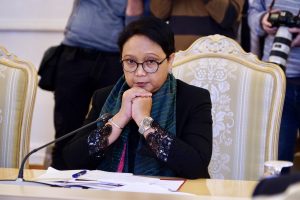Indonesia continues to push forward with its plans to coordinate a regional response to the unfolding political crisis in Myanmar. On Wednesday evening, the country’s Foreign Minister Retno Marsudi flew to Bangkok, where she held three-way talks with the Myanmar junta’s new foreign minister Wunna Maung Lwin, a retired army colonel, and their Thai counterpart Don Pramudwinai.
The meeting at Don Mueang International Airport, the first known face-to-face discussion between a senior junta member and foreign government official since the coup of February 1, was intended to “contribute to seeking the best possible solution to address the recent situation in Myanmar,” Retno said in an official press briefing after the meeting.
During the talks, Retno said, she called on “all parties to exercise self-restraint and to refrain from violence to avoid any casualties and bloodshed.” She added that Jakarta “continues to emphasize the importance of an inclusive democratic transition process” and said the junta government should engage in “dialogue, reconciliation, and trust building.”
Retno said she had conveyed the same principles to the Committee Representing Pyidaungsu Hluttaw, a group of Myanmar parliamentarians elected at November’s national poll.
Retno’s foreign ministry has been spearheading a diplomatic push to get the Association of Southeast Asian Nations (ASEAN) involved in addressing the crisis that has developed in Myanmar since the coup. Last week, Jakarta’s top diplomat visited Brunei, this year’s ASEAN chair, and Singapore. According to her press briefing after her Bangkok trip, Retno said that she has also held remote talks with the foreign ministers of the Philippines, Malaysia, Singapore, Vietnam, Laos, and Cambodia, as well as officials from the United States and United Kingdom.
The Bangkok meeting came after a brief planned trip to Naypyidaw was canceled at the last minute. Retno said merely that the trip “had to be postponed,” but it was a clear reaction to the local anger that greeted the news of her visit, which many Myanmar protesters saw as legitimizing the military’s seizure of power.
In the words of the Myanmar activist group Future Nation Alliance, engaging in “official communications” with Naypyidaw was “tantamount to recognizing the military junta.” In announcing the delay, Indonesian Foreign Ministry spokesman Teuku Faizasyah later admitted, “this is not the ideal time to conduct a visit to Myanmar.”
A similar outcry followed reports that Indonesia was aiming to rally ASEAN behind a demand that the junta stick to its promise of holding free and inclusive elections in a year’s time, and allow ASEAN to dispatch election monitors to scrutinize it. The following day, anti-coup protesters gathered in front of the Indonesian Embassy in Yangon, accusing Jakarta of accepting the coup and calling on it to stand up to the generals.
Both of these incidents point to the fine line between engaging the generals and legitimizing their seizure of power. Who foreign governments speak to in such situations undoubtedly makes a difference, and Thai Prime Minister Prayut Chan-o-cha’s meeting with Wunna Maung Lwin yesterday sent a strong signal of Thai acquiescence for the new status quo in Myanmar (as well he might, having recently led a coup himself.)
Leaving aside ASEAN’s temperamental resistance to moving quickly on urgent regional crises – the Thai government announced today that the bloc will hold an informal meeting in August, six months from now – all this puts Indonesia in a tricky position. Jakarta would no doubt be cognizant of the fact that its words and actions will do little to force the junta to reverse the coup and restore the NLD government, and that simply preventing further violence will be challenging enough. At the same time, it needs to recognize that the junta is seen as illegitimate by the majority of the Myanmar population.
This tension found expression in Foreign Minister Retno’s press briefing, in which she referred to Wunna Maung Lwin by name but not by his formal title of foreign minister. Similarly, Retno said in her news briefing that “Indonesia will always stand with the people of Myanmar,” but also added that “the safety and the well-being of the people of Myanmar must be the number one priority to safeguard,” something that would seem to imply that Indonesia views as unrealistic a reversal of the coup.
Whether these sorts of blink-and-you-miss-it diplomatic subtleties will make a difference on the streets of Yangon or Naypyidaw, however, remains to be seen. In the end, conferring a default amount of legitimacy may be among the many prices of an attempted mediation in the current crisis.

































